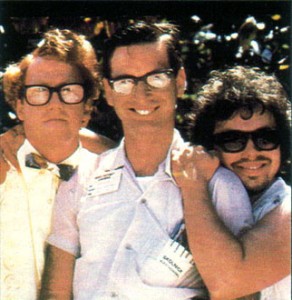
Having lost on multiple game shows, competed on high school and college quiz teams, and participated in all manner of bar trivia competitions, I consider myself an authority in competitive trivia. I’m pretty good (but not great – see the Jeopardy video link on the sidebar). I’d rather be good at something people care about, like football, but being good at trivia is better than being good at, say, long-distance spitting. I’m a pretty competitive person, so if all I could do was spit really far, I’d probably enter those competitions. As it is, I quench the competitive fire by competing in trivia games.
Many people ask me how they can improve their own trivia skills, so I’ve decided to share with you all my secrets to becoming a trivia master. Now you too can beat your Aunt Hilda at Trivial Pursuit, or win a free basket of Xtreme Chicken Nacho Fries at Tulligan’s Bar Tuesday Trivia X-Travaganza.
The key is Negative Reinforcement Studying. Trying to memorize long lists of facts will get you nowhere – you can memorize facts and names all day long but it won’t help you remember any of it when the Nacho Fries are on the line.
Scientists have studied this problem and found that the best way to remember things is to tie them to an experience. Negative experiences work better than positive ones. For instance, what would help you remember the name of the Secretary General of the UN?
- You study and memorize the name “Ban Ki Moon” on a flash card.
- Ban Ki Moon comes up, shakes your hand and compliments your haircut.
- Ban Ki Moon runs up, kicks you in the stomach, and takes your wallet.
I think most of you would go with answer #3. For this reason, I like to structure the negative and painful events in my life so that they improve my trivia skills. Here are some examples of ways you can use this technique to improve your performance in specific subjects:
- Geography. Have a humiliating sexual encounter in every world capital. Then when you’re trying to remember the capital of Cambodia, just think of the shameful one night stand you had with a street vendor – “oh right, that was in Phnom Penh!”.
- Chemistry. Every night for 118 nights, cook a meal using one of the elements of the Periodic Table. It’s tough to memorize that element “Rg” is Roentgenium, but you’ll never forget it if you make it into Roentgenium Tuna Casserole and it makes your pee glow green.
- History. Dress up like historical figures and go deliver lectures “in character” to gang members in the worst neighborhood you can find. As you’re being beaten to a bloody pulp, think about how Robert E. Lee or whoever would react to this situation.
- Government. Attempt to get a restraining order issued against you by all 100 US Senators. Roland Burris is optional.
- Film. Watch the entire AFI 100 Greatest Films back to back without a break. You may have to use a machine to keep your eyelids open like in A Clockwork Orange (which ironically is one of the films you’ll watch).
- Literature. Turn off the television and actually read some of the books. This is one I just couldn’t bring myself to do.
The next step is to figure out what are the important facts to remember, and which ones you can safely forget. Here are some examples:
- Presidents. I memorized all of them but it was a waste of time – the only ones that you ever get asked about in trivia competitions are Washington, Lincoln, Ben Franklin, the Roosevelt brothers, and the new guy – what’s-his-name.
- U.S. States. If it doesn’t border an ocean, it doesn’t matter enough for bar trivia. Exception: the state you live in, you should probably know that.
- Art. Here are the only artists that matter to anyone in 2009: Monet, Michaelangelo, Picasso, Van Gogh, Dali, Thomas Kinkade, and the guy that draws Family Circus. Memorize their life stories and major works – next subject!
- Music. Trivia question writers love to write questions about dead Italian composers. Make use of the mumble technique – just answer “Fettucine Tortellini” in a low, garbled voice, and it will sound close enough to Puccini or Verdi or whoever.
- Math. Ignore this subject entirely, people who are into trivia don’t know math and people who are into math don’t know trivia.
I hope this helps – now go out and win those Nacho Fries!
That’s hillarious. Keep it up, Tim! 😀